
Tens of thousands of workers demonstrated against the rising cost of living, with many linking the crisis to the NATO’s war and Russia policies. Many demonstrators condemned the US-led NATO alliance and its involvement in the Ukraine war. Many linked their dire economic straits to the EU’s sanctions regime on Russia and with the NATO’s rush to arm Ukraine.
Protesters demanded that their leaders “spend money on salaries, not on weapons,” and chanted “stop NATO.”
Media reports said:
Workers marched through Brussels on Monday demanding government action to tackle sharply rising living costs, as one-day strikes at Brussels Airport and on local transport networks nationwide brought public travel to a near-halt.
Protesters carried flags and banners reading “More respect, higher wages” and “End excise duty”, and many protesters set off flares. Some demanded the government do more, others said employers needed to improve pay and working conditions.
Unions said about 80,000 were present. Police put the figure at 70,000.
Local public transport operators were running skeleton services, though some train lines were operating, partly to allow protesters to converge on the capital.
Inflation in Belgium hit 9% in June, mirroring sharp rises elsewhere driven primarily by the impact of war in Ukraine on supply chains and energy and commodity prices.
Belgian Prime Minister Alexander De Croo said Belgian workers were better protected than counterparts in most other European Union countries because wages were indexed to inflation.
He told public broadcaster RTBF the government had extended sales tax breaks on gas, electricity and fuel until the end of the year.
The trade union-organized protest packed the streets of Brussels, bringing the city to a standstill.
While similar protests against rising costs have taken place across Europe as of late – thousands of trade unionists marched in London on Saturday – few have linked the soaring prices with the actions of NATO and its members.
Just three months ago, some protesters in Brussels waved Ukrainian flags and demanded that the EU cut itself off from “Putin’s Oil.” Weeks before that, there was a demonstration outside European Parliament buildings calling for “sanctions for Russia.”
Brussels is home to headquarters of both the EU and NATO. It was also the city from where U.S. President Joe Biden chose to announce a round of sanctions on Russia in March, before immediately telling a reporter that “sanctions never deter” those targeted by them.
Russian President Vladimir Putin has accused European countries of committing economic “suicide” via sanctions, and predicted last week that the EU’s “direct losses” from this sanctions policy “could exceed $400 billion in a year.”
The Belgian protest, organized by the ACV, ACLVB and ABVV trade union federations, heralds the start of a week of industrial action across Belgium.
The unions want political leaders to do more to address the cost-of-living crisis and to reform legislation to allow easier salary negotiations.
Flemish public transport operator De Lijn warned trams and buses would be affected by worker absences and route closures.
Brussels Airport said it could not allow passenger flights to depart because the industrial action extended to security personnel, and most arrivals were also cancelled. In addition to packing the streets, the protest led to mass cancellations of flights at Brussels Airport, as unions representing security personnel went on strike. Public transit routes around the city were also operating at drastically reduced capacity.
Management at Brussels Airport warned of queues of up to eight hours at security screening after a walkout by G4S security staff.
The company advised passengers not to come to the airport and to rebook their flight “if possible”.
Most scheduled flights on Monday, including all outbound flight, were cancelled. Brussels Airport said it could not allow passenger flights because of the security walkout.
Management at Brussels South Charleroi Airport, a hub for low-cost airlines such as Ryanair, urged passengers to arrive at least three hours before departure, amid disruption concerns.
Belgian unions representing cabin crew of Ryanair say they plan a strike from June 24 to June 26, during a peak holiday weekend and an EU summit in Brussels on June 23 and June 24.
Unions at flag carrier Brussels Airlines plan to go on strike at around the same period.
The ACV and BBTK unions say Ryanair is not respecting Belgian labor law, which covers such issues as the minimum wage and cabin crew payments.
Some of Europe’s busiest airports have been affected by staff shortages and logistical issues in recent weeks.
Amsterdam
Cleaning staff at Amsterdam’s Schiphol Airport went on strike on Monday after they were not part of 5.25 euros per hour pay bonus given to 15,000 other workers at the airport.
UK
There was also flight disruption at UK airports caused by staff shortages and equipment failure, while the UK is set to be crippled by industrial action on Tuesday.
Heathrow on Monday asked airlines to cut 10 per cent of flights at two terminals on Monday, while easyJet has started cancelling thousands of flights.
The move by Heathrow affected around 5,000 passengers at Terminals 2 and 3 on approximately 30 flights.
An Emirates Airbus A380 with almost 500 passengers to Dubai was one of the flights that were grounded.
Other cancellations included at least three Virgin Atlantic transatlantic flights, two of them to New York and Los Angeles.
British Airways said it had cancelled flights to France, including three destined for Toulouse and two for Marseille.
It comes after images emerged on Friday of a huge pile-up of passengers’ luggage at Heathrow. It has been blamed on technical problems.
Heathrow “apologized unreservedly” in a statement for the disruption faced by passengers at the weekend.
Meanwhile, Britain is bracing itself for three one-day strikes on its railways starting on Tuesday.
The strikes by the Rail, Maritime and Transport union are likely to severely disrupt services on the railways and London Underground, with increased traffic expected to choke roads during the summer.
















































